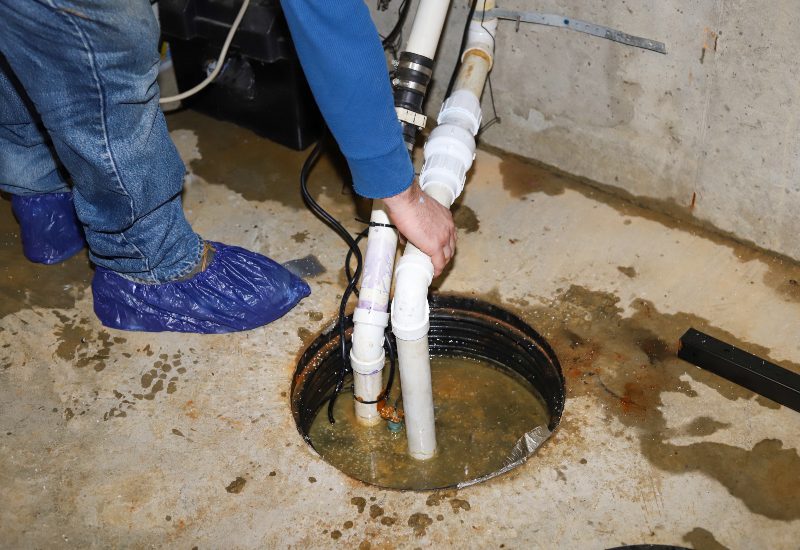Comprehending the Trick Elements of Effective Water Purification Solutions

Relevance of Water Purification Solution
Water purification systems play a vital role in ensuring accessibility to risk-free and tidy drinking water by successfully removing pollutants and impurities. These systems are essential in resolving the expanding worries over water quality and the prospective health and wellness threats connected with consuming contaminated water. By utilizing different purification systems such as reverse osmosis, activated carbon, and UV sanitation, water filtration systems can effectively get rid of unsafe substances like bacteria, infections, hefty steels, and chemicals from the water supply.
Moreover, water purification systems assist to enhance the taste and smell of water by getting rid of chlorine, sediments, and other pollutants that can impact its high quality. Pump repairs & installation. This improvement in water high quality not only makes it much more palatable however also urges individuals to consume alcohol an ample quantity of water daily, advertising better hydration and general wellness
Sorts Of Purification Components

Physical filters are made to literally stress out impurities from the water. These filters can be made of materials like ceramic, carbon, or also sand, and they work by trapping fragments larger than the filter's pores as water passes through.
Chemical filters make use of numerous chemical processes to get rid of pollutants from the water. Instances consist of turned on carbon filters, which adsorb impurities, and reverse osmosis membranes, which make use of stress to separate impurities from the water.
Biological filters use living microorganisms like algae or bacteria to break down raw material and toxins in the water. These filters are frequently used in wastewater therapy plants or natural water purification systems.
Understanding the different types of purification parts is crucial for selecting one of the most ideal water filtration system for particular purification needs.
Function of Debris Filters
Debris filters play an important function in water purification systems by successfully capturing solid bits put on home hold in the water. These filters are typically the first line of defense in a filtering system, removing larger particles such as sand, silt, dust, and rust prior to the water moves via finer filtering phases. By trapping these sediments, the filters prevent them from getting to downstream components, hence extending the life expectancy and efficiency of the whole system.
Disregarding this maintenance can lead to blocking, minimized water flow, and endangered filtering performance. In general, debris filters are essential components that add substantially to the efficiency of water filtration systems.
Role of Triggered Carbon Filters
Playing an important role in water filtering systems, triggered carbon filters contribute in removing pollutants and pollutants from the supply of water. These filters are developed to adsorb and catch a vast array of pollutants, including chlorine, unstable natural substances (VOCs), pesticides, and herbicides. The triggered carbon product has a large surface, enabling the effective capturing of contaminants via a process called adsorption. As water passes via the filter, the turned on carbon holds and brings in onto the contaminations, ensuring that the water that appears beyond is cleaner and more secure for consumption.
Turned on carbon filters are extremely efficient at enhancing the taste and smell of water by decreasing chemicals that can affect its top quality. Due to their convenience and dependability, turned on carbon filters are a vital element in guaranteeing that water is cleansed to the greatest criteria prior to getting to consumers.
Recognizing Reverse Osmosis Systems
Reverse osmosis systems are advanced water purification systems that employ a sophisticated process to eliminate impurities and pollutants from drinking water. These systems work by using find out here stress to the water, compeling it with a semi-permeable membrane.
In addition, reverse osmosis systems are fairly low-maintenance and can be mounted under the sink or in a central filtration system, giving hassle-free accessibility to tidy water throughout the house. Generally, recognizing exactly how reverse osmosis systems work can aid people make informed decisions concerning their water filtering needs.
Verdict
Finally, reliable water filtering systems are vital for making certain risk-free and tidy drinking water. The essential components of these systems consist of sediment filters, activated carbon filters, and reverse osmosis systems. By recognizing the feature and function of each component, people can make enlightened choices when choosing a water filtration system. It is very important to focus on the quality of water in order to advertise total wellness and wellness.
Water purification systems play an important duty in guaranteeing accessibility to safe and tidy alcohol consumption water by successfully removing pollutants and pollutants. By website link utilizing different purification devices such as reverse osmosis, triggered carbon, and UV sanitation, water purification systems can effectively get rid of unsafe compounds like germs, infections, hefty metals, and chemicals from the water supply.
Debris filters play an important role in water filtration systems by successfully recording strong particles put on hold in the water (Water Filtration Systems).Playing a vital function in water filtration systems, turned on carbon filters are instrumental in removing pollutants and impurities from the water supply.Reverse osmosis systems are advanced water purification systems that use a sophisticated procedure to get rid of contaminants and impurities from drinking water